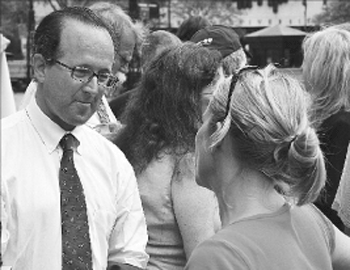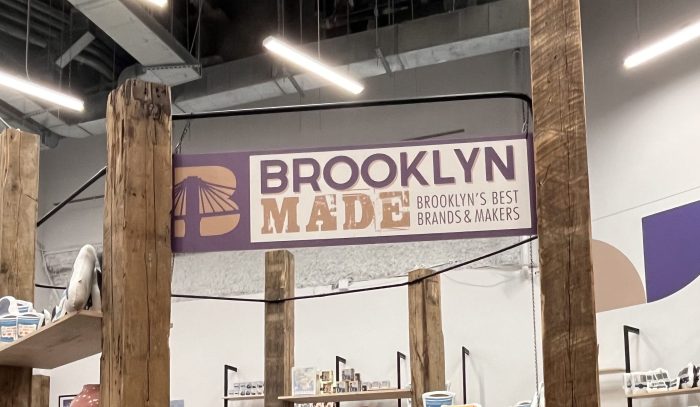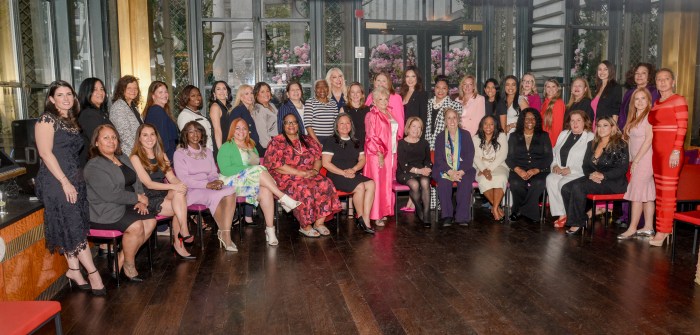Clinton Senate Challenger Wants Debate on War, Marriage Equality
“If you put my issues in one column and her issues in the other column, and you took our names off, I would win this primary and I don’t think it would be close.”
So said Jonathan Tasini, the would-be giant slayer, at the conclusion of a nearly one-hour interview with Gay City News on August 31.
For the past nine months, Tasini, a former journalist and longtime leader in the fight for the rights and economic security of freelance writers, has traveled New York State in what many pundits characterize as a quixotic challenge to Senator Hillary Rodham Clinton’s reelection.
That effort, much of it animated by Tasini’s fierce opposition to the Iraq War, will draw to a close with the Democratic Primary next Tuesday, September 12, and the challenger will surely be the loser by the traditional standard of the vote tally.
But Tasini, 49 years old, button-downed, and unfailingly precise in response to questions across a broad array of issues, betrays neither fatigue nor any bitterness, even as he chastises the media for what he characterizes as a “woeful” disengagement from the substance of the race. Instead, if the word can aptly be applied to a man with such low-key intensity and a nearly technocratic temperament, Tasini seems buoyed by the reaction he has gotten from voters and also from his unwavering conviction that they are on his side, on the issues if not prospectively in the voting booth.
“It’s been really wonderful,” he said, when asked how he’s been received across New York. “I’ve been campaigning since December. And even the people who say they aren’t going to vote for you are very receptive. They understand that running for office is a challenge on many levels. So people have been very great.”
In Tasini’s view, his stumbling block is getting his message out.
“Two-thirds of the voters, roughly two-thirds of the voters say that they are against… they will support someone who is against the war, and only about 10 percent say they will support someone like Hillary Clinton who supports the war,” he said. “At the same time, about two-thirds of the voters say they don’t know who I am.”
He simply cannot compete against the incumbent’s money and her spin machine, which he insists has succeeded in muddying her position on the war.
“I cant advertise,” Tasini––who has raised only $150,000 versus the estimated $33 million Clinton has in her coffers––said of the challenges he faces in introducing himself and contrasting his views from those of the former first lady. “And it’s been the result of her very cleverly obfuscating her position on the war and purposely trying to confuse voters and it’s why she doesn’t want to debate me because to debate me is going to make clear to voters where she stands.”
Pointing to the senator’s recent tough Armed Services Committee questioning of Bush’s defense secretary and her call for his resignation, he said, “You know that’s no great shakes. Even Republicans are criticizing Donald Rumsfeld. So criticizing Donald Rumsfeld is not a significant change of position.”
Tasini was similarly dismissive of a statement Clinton issued Monday that said, “I support a phased redeployment of U.S. forces from Iraq that should begin before the end of 2006.” Clinton issued the statement in conjunction with her singing onto a letter from leading congressional Democrats to President George W. Bush raising concerns about the escalating violence in Iraq. In response, Tasini said, “‘Phased redeployment’ is a public relations phrase for keeping our troops in harm’s way indefinitely.”
Tasini returns again and again and again to the issue of the debates that he says the senator and the media are denying him and the voters of New York. He is harshly critical of Clinton for ducking a one-on-one encounter with him, but as well he is withering in his barbs aimed at New York 1 News for its refusal to include him in the debate and candidate town hall events it is hosting in a number of primary races.
“It’s going to be a big chapter in my book,” he said. “I say this as a person who formally made his living as a journalist.”
When asked what issues a debate, were one to happen, should focus on and whether Clinton would have earned a challenge in the absence of the Iraq War issue, Tasini was careful to distinguish between whether she would have merited one and if one could have been mounted.
“She has been a mediocre senator,” he argued. “I think that that if you look at the record and not at the hype and the press releases and the spin, she’s been a mediocre senator. She’s hasn’t taken leadership on very many major issues. The major issues where she’s taken a position, often she’s been wrong.”
Tasini then went on to list the flagging upstate economy, “so-called free trade” and NAFTA, which he termed “a disaster,” flag burning, and marriage rights for same-sex couples.
“Just go down the list,” he concluded. “Would she merit [a challenge]? Absolutely, but then from a practical standpoint, could you generate the enthusiasm and the support for those issues? Hard to tell. I think the war gives the energy to talk about the broader crisis facing the country.”
Democrats nationally, in Tasini’s view, are integral to that crisis.
“I think part of the problem with the party is that it’s had no courage and no willingness to have courage to stand up to the Republicans,” he said. “When you’re not willing to be courageous and stand up and have some principle, then you do what Democrats have done. They’ve had no spine. They’ve capitulated to the Republicans on the war and on other issues as well. To some extent one of the reasons I’m in this race is to put some spine in the Democratic Party because I think the Democratic Party has lost its way.”
Asked about the dearth of national party leaders willing to endorse marriage equality, Tasini said, “I find, at least in the Democratic Party, their trembling about this to be a lack of moral principle and moral strength. I feel strongly about that.”
On his Web site, in a series of position papers, and in comments during the August 31 interview, Tasini elaborated on a wide range of other issues where his views dovetail with those of progressive Democratic activists in New York:
that employment-based health insurance has failed the nation and must be replaced by single-payer, universal care (in his proposal, administered through Medicare, which he described as “the most efficient part of our national healthcare system”);
that former President Bill Clinton’s welfare reform, celebrated this summer as the progenitor of a decade of progress, has in fact failed many, primarily single mothers;
that “the main factor in [international] trade agreements is driving wages down,” instead of using the economic might of the U.S. and the West to push for worldwide improvements in living standards;
and that the nation’s dependence on oil has never seriously been challenged by a commitment to alternative energy.
Despite the fact that Tasini is informed, articulate, and even compelling in making arguments that many Democrats believe need to move center stage in the national debate, his candidacy has not attracted the glamour and insurgent support that Ned Lamont, who was able to sew his own deeper pockets, attracted in his successful primary challenge to Senator Joe Lieberman in Connecticut.
James Dean, who heads Democracy in America, the grassroots group inspired by his brother Howard’s 2004 presidential bid, and who pushed hard for Lamont, told The New York Times, “I think progressives are a lot more pragmatic than most people think, and there are only so many battles that you can pick in one year.”
In an online poll of its New York State members, moveon.org found 56 percent for Clinton versus 44 percent for Tasini, though the incumbent failed to reach the two-thirds threshold for endorsement.
When asked about the failure of leading left groups with Democratic Party ties to rally to his cause, Tasini chose to focus on the positive. He noted that in the three Democracy in America local affiliates that voted—in New York City, Long Island, and Rochester—he won endorsement. In a written statement September 1 about the moveon.org results, he stated, “These results are a broader indicator than other polls that have come out because they give the opinion of many more voters among the Democratic activist base. I am very heartened by the outcome.”
And Cindy Sheehan, who lost her son in Iraq and has dogged President George W. Bush over the war, is supporting his challenge to Clinton.
Tasini also pointed to endorsements by long-standing fixtures in the local party, including Lower Manhattan’s Village Independent Democrats and Downtown Independent Democrats.
Tasini dismissed Clinton’s solid union support by arguing that he is a more forceful advocate for organized labor—he led the National Writer’s Union for 13 years, during which he prevailed over The New York Times in a freelancer compensation lawsuit. He also spearheaded the floor fight at the parent United Auto Workers for a sexual nondiscrimination policy, which put fair hiring and domestic partnership policies on the table in all its negotiations.
Still, among LGBT Democratic clubs in the city, only the relatively new Jim Owles Liberal Democratic Club is supporting Tasini, with Brooklyn’s Lambda Independent Democrats making no endorsement. Among other leading clubs, both the Gay and Lesbian Independent Democrats and the Stonewall Democratic Club of New York City are with Clinton, despite her opposition to marriage equality. Clinton has also failed to meet with Greater Voices, the coalition of LGBT clubs citywide, despite efforts by that group going back nearly two years.
Asked specifically about the paucity of organized gay support for his candidacy, Tasini said, “I don’t know if disappointment would be the right word… Most organizations, whether in the gay community or not, do not want to take on a powerful incumbent who has a powerful machine—they make lists and they remember who’s not with them.”
“It is an interesting thing, a self-fulfilling prophecy, Tasini said of his difficulties garnering support from progressives generally, “where on the one hand lots of people say that we hate the fact that everything is poll-driven, we hate the fact that everything is about money and that people focus on fundraising, but then all those groups regurgitate that back to you.”
Yet the insurgent candidate seems genuinely less concerned with the lack of institutional support than he does with the inability of New Yorkers to enjoy an open and spirited discussion of vital issues this election year and with the failure of the media to provide a forum for that dialogue, despite its own hand-wringing about the lack of substance in politics.
“That’s the sad thing about it,” he said—“it’s not me personally; I think I’d be a fantastic United States senator—but the fact that people are not going to have the senator in this state who represents what they want.”
gaycitynews.com


































